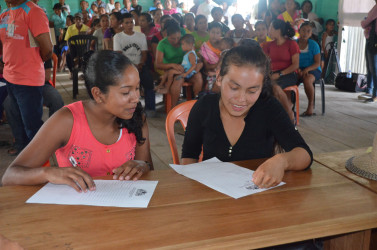The Ministry of Indigenous People’s Affairs’ Hinterland Employment Youth Service (HEYS) programme kicked off in Paramakatoi on Thursday with more than two dozen young people registering for the skills’ development scheme.
Minister within the Ministry of Indigenous People’s Affairs Valerie Garrido-Lowe and her ministerial team along with Joel Fredricks, Chairman of the National Toshaos Council (NTC), made the trip to the Region 8 community to launch the programme.
Addressing residents at the Paramakatoi Multipurpose Centre, Minister Garrido-Lowe referenced the recently cancelled Youth Entre-preneurship and Apprenticeship Programme (YEAP), under which almost 2,000 Indigenous youth were recruited as Community Support Officers. She noted that the APNU and AFC had supported the programme because they understood the problems that hinterland communities face on a daily basis. However, she believes that programme was not enough.

“To me, as an Indigenous woman, as an Indigenous mother, I knew that that programme was not enough. It did not cater to develop and empower our youth in a positive way,” Garrido- Lowe said, while explaining that the new programme has been designed to “build you as a person, so that you can earn for yourself and contribute to society.”
She continued to offer encouraging words to potential participants, explaining that at some point, they will be looked upon to take over the management of their communities and, on a larger scale, the nation. She noted, however, that in order to be a part of that process self-development was crucial.
“The more you learn, the better it would be for you… The more you will be empowered,” the minister stressed.
She reinforced government’s efforts to keep the promises made on the campaign trail as she described President David Granger as someone who could be depended on to “treat all of us as equals.” She noted that he has plans to close the large gap between the hinterland and the Coastland.
Second chance
Also stressing the importance of education and skill development, the NTC chairman urged the youth gathered in the building to see the programme as a second chance in life to “be something and to do something meaningful for yourself and your community.”
Fredricks threw his full support and that of the council behind the programme, while expressing his opinion that in Guyana, “Indigenous people are the most vulnerable people to issues and problems.” This is as a result of their residency in the hinterland areas of the country, he stated, and them not being afforded the same opportunities as coastlanders.
“Today I want to call on you residents: make that sacrifice to support your children in school and those who will be coming on board this programme. It is an investment that the Government of Guyana is making now for the future development, whereby lives and communities can be better off,” he added.
The programme, which will run for one year, will target Indigenous youth between the ages 18- 35 and will see the participants receiving a monthly stipend of $30,000. They will be given $20,000 each month while the remaining $10,000 will be saved on their behalf and handed over at the end of the programme.
Additionally, on completion of the programme, the successful participants interested in opening their own small businesses in their communities will be offered small grants.
“After one year, you should be able to go to Government Technical Institute or the Guyana School of Agriculture or Carnegie if you wish; or if not, open your own business. This is your second chance to go forward,” the minster added.
The programme will facilitate in-house and practical training during the first half with another six months attachment to an office/organisation in a field that is relevant to the students’ area of study. The Ministry of Educa-tion is collaborating with the Ministry of Indigenous People’s Affairs to facilitate the programme.
The vocational training that will be offered includes plumbing, joinery, auto mechanic, carpentry, cookery, sewing, eco-tourism and hospitality.
Eco-tourism and hospitality have been incorporated owing to the fact that the hinterland has much potential for tourism. Students, who will be attending classes, Mondays to Fridays, will be offered lessons in both Math and English in an effort to perfect report and business proposal writing. Life coaching, self-development training, entrepreneurial training, project design and planning, proposal and grant writing, public speaking, leadership training, environmental management training, culture and heritage management training, sustainable tourism and journalism are other courses that will also be made available to the participants of the HEYS programme.
Additionally, workshops will be held to address pressing issues, including trafficking in persons, drug and alcohol abuse, gender-based violence and teenage pregnancy.
Within the next month, the programme is expected to be extended to the neighbouring communities of Mountain Foot and Bamboo Creek.
Back in June, Minister of the Indigenous Peoples Affairs Sydney Allicock had told residents of Orealla/Siparuta, Region Six, that government was in the process of reviewing the CSO programme implemented under the YEAP as it failed to provide students with a skill certificate.
While in opposition, APNU and the AFC had accused the PPP/C of using the CSO and YEAP programmes to campaign and to gather votes; $60 million was being expended monthly to facilitate the programme.









